
Image by OpenClipart-Vectors from Pixabay
Remember the so-called hippie vans of the 60s, those iconic Volkswagen vans that graced the covers of music albums for rock groups like the Beatles and Bob Dylan and will be forever associated with the infamous Woodstock music festival?
If you are a Baby Boomer, then you know exactly the style VW van I’m referring to. Maybe you owned one. It was popular not only as a counter-culture symbol (often with a peace sign painted on it) but as a practical way for young people to travel the country inexpensively, living in the van.
Given that history, maybe it’s not surprising that our generation is once again sleeping in home-made camper vans, or more specifically, minivans and SUVs. Minivan camping has become a thing, and while it’s enjoyed by people of all ages, a significant number of retirees have adapted their minivans for use as makeshift campers.
Kathy and I recently purchased a used Chrysler Pacifica minivan, the first minivan we have owned since the children grew up. That piqued my interest in learning whether it would be practical to take the minivan on short trips and sleep in it, since we don’t own a recreational vehicle (RV). I discovered there’s a whole world of folks out there like me outfitting their minivans and SUVs for camping. All you have to do is start a web search for a term like “minivan camping” or spend a few minutes on YouTube or Pinterest to learn about the creative ways people go about making their minivans just right for a comfy few nights (or more) on the road.
I will share more about my first experience sleeping in a campground in my Pacifica later in this article, but for now let’s look at the obvious question of why people go to the trouble of making their minivans camper-ready when there are plenty of larger vans and RVs already designed for this purpose.
Why Sleep in a Minivan Instead of an RV?
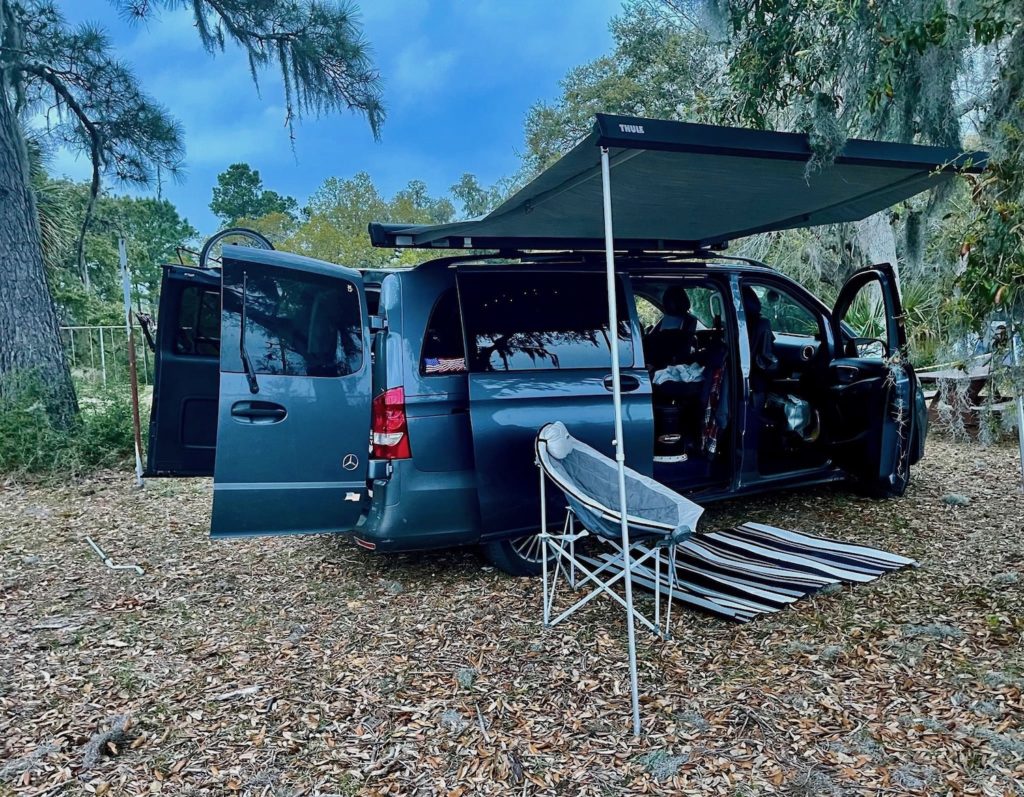
When talking with minivan campers, you quickly realize the benefits of sleeping in minivans go well beyond merely the fact that it’s cheaper than buying and operating an RV.
“On our road trips we just need a place to sleep. We are out exploring, biking, beaching and not in the hotel. It seems a waste of money for a hotel/motel just to come back to sleep,” said Kristen, who lives in Florida and camps with her husband Bob in their minivan. Kristen is one of several minivan owners I met through a Facebook group called MinivanRV Camping, which has more than 10,000 members.
“Also in my van I have very comfy linens, pillows, etc. and in motels, not so much,” Kristen added.
One benefit of camping in a minivan that Kristen and others mentioned is that it is a “stealth” experience, since to outsiders it isn’t obvious that the minivan is being used for camping. This is especially important if you are boondocking, or sleeping off-the-grid and not in a campground. Yes, people sometimes sleep in their minivan campers for free everywhere from Walmart and Cracker Barrel parking lots (call ahead first to confirm; not all locations allow overnight parking) to rest stops. In the United States, wilderness areas managed by the Bureau of Labor Management (BLM) and Forest Service also allow free or low-cost camping opportunities.
“Nobody notices it,” Kristen said of her minivan. “Its a soccer mom car that blends in and I like that.”
Another minivan camper, Essa Moon, noted that the stealth nature of sleeping in her minivan makes it a safer place, less likely to attract attention.
“For me it (minivan) is more drivable and stealth, aka, safer, than an RV.”
Essa also pointed out the added convenience of staying in her minivan versus hotels.
“I like everything contained in one unit; no unpacking or worrying if things left in a hotel or things in a hitched trailer.”
Compared with most RVs, minivans also win points for their much-better gas mileage and convenience. Larger RVs, in particular, are notorious for their poor gas mileage, adding to the overall cost of travel.
“While a formal RV has its perks, it also requires a lot of expense and effort to modify/maintain,” said retiree Dennis Panczenko. “I think the biggest upside to minivans put into one word would be: convenience. The only thing I miss is stand up space when dressing.”
“I like the flexibility of being able to keep the bed inside and, when we stop overnight, we just move the cooler to the front seat,” said Peggy Sawders Hunton. “It’s so much simpler than dragging a tent out and cheaper than a regular RV.”
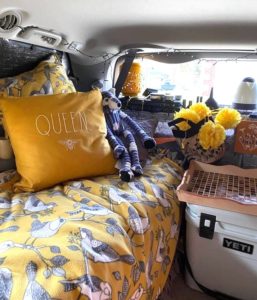 Retiree Judith Ziffer is an experienced camper and has owned all sorts of RVs in the past, but she still prefers her minivan camper.
Retiree Judith Ziffer is an experienced camper and has owned all sorts of RVs in the past, but she still prefers her minivan camper.
“I have camped/RV’d since I was a toddler and have camped and owned tents, pop up’s, towable trailers, Class A to 40 foot, Class B, and Class C,” Judith said. “I like the convenience of a minivan. I can visit family and friends and still keep my own space. I don’t have to worry about HOA (restrictions) or paid storage between trips. My minivan is an easy fit in my garage.”
Several minivan campers mentioned HOA rules in their neighborhoods which make it impossible to park RVs on their property. Minivans, on the other hand, comply with neighborhood rules and fit neatly in the garage, something that can’t be said for most RVs.
Many retirement communities also restrict the parking of RVs in their parking lots or at homes. Dale Dobson, who lives in such a facility, says if it weren’t for his minivan, he would not be able to continuing enjoying his long-time love of camping.
“I currently live in a senior retirement home, so parking restrictions are numerous. The (1989 Ford) Aerostar I call Lucy, (as in Lucy, I’m home!) is perfect as a minivan camper for one, a daily driver for shopping, medical appointments, etc. Most of us who camp, wander, and explore seek the freedom of being in nature, admiring all of our Creator’s handiwork. I am the same. A few days camped in the forest, or out on the desert, restores my sense of peace and tranquility.”
Regardless of their reasons, many seniors (and others) love to travel (and camp) with their minivans.
“We picked up our minivan conversion last summer. I have camped with my husband or daughter 15+ times since July, traveled solo Minnesota to Los Angeles this fall, and camped with my son, taking it (the minivan) out to Boston next week,” said Anne Bostrom DeMotts. “I love the flexibility of being able to pick up and go when I want; sleep when I need to. I really considered the Travato or Solis (Winnebego camper vans), but for more than half the price, I can park (minivan) in my garage, use it as a daily driver, and park anywhere.”
Daniel Pitts Winegarden says he and his spouse now drive a Cadillac SRX SUV but miss their former Chrysler minivan.
“We traveled extensively with our minivan accessorized with a standup tent, cots, awning, chairs, and a portable kitchen,” Daniel said. “By comparison, an SUV lacks the headroom and the convenience of power sliding doors. When it comes to travel utility and especially camping? Our now departed Chrysler minivan with Stow’n Go seats ruled. Easy conversion between passengers and cargo. And plenty of room for two people to lay down.”
Solo or Room for Two?
Unlike larger RVs, minivan space is limited, so perhaps it’s not surprising that minivans are popular with solo travelers. From my research and observation, there seem to be an equal number of men and women who travel solo and camp along the way in their minivans. Minivans can, however, be outfitted to sleep two, and some couples do travel together, or some solo travelers share the quarters with their dog.
“I have been retired four years; hubby is still working,” said Melissa Johnson Martin, who travels both solo and with her husband in their minivan. “I grew up in a traveling family. We camped all over North America. I met my husband in the Army and we both loved traveling and broadened our travels to Europe staying with family there. My military background has really developed my sense of challenge and adventure. No longer wanting to camp in a tent, I looked at my minivan and mentally configured a layout and off I’ve gone. My trips average two to three weeks only because I miss my husband and kids. I come home and start planning my next trips as I do my laundry.”
Build or No Build?
Minivan campers fall into two groups, the so-called “build” and “no build” groups.
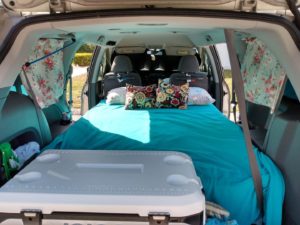
Kristen & Bob’s minivan camper layout.
For the “no build” van owners, it’s important to keep their vehicle intact, not doing anything to alter or damage the interior layout. For many in the “no build” group, the minivan does double duty as a people hauler when they are not camping, so it’s important to be able to remove the camping gear and put the original seats back in place.
The “build” group does a more complete overhaul, often adding RV-like equipment such as solar panels, electric outlets, TVs, and small kitchens. Minivans in the “build” category cannot be as easily and quickly converted back into a four-or-six passenger vehicle, but the benefits are that “build” minivans have more RV features and reduce the hassle of having to set up the van each time you want to go camping and break it down afterwards.
Even with a no-build approach, there’s much you can do to transform a minivan into a comfortable sleeper. Many owners build wooden-frame beds with built-in storage underneath. A simple kitchen or additional storage can be built into the rear of the frame for access from the open hatchback. Depending on the construction, these beds may either be folded back or removed when you need more seats for passengers. Some beds convert into couches during the day.
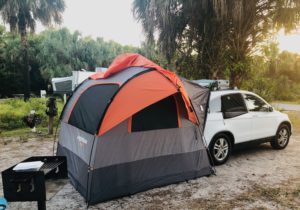
Even a small SUV can serve as a camper with accessories like this hatchback tent.
Other minivan campers opt for ready-made steel or metal-framed beds or cots. Mattress choices range from sectional, foldable four-inch portable mattress pads to self-inflating air mattresses. You can, of course, put a mattress directly on the floor, but that means you lose the valuable storage space underneath the bed. When traveling in a minivan, wisely utilizing all available space is important.
Most minivan campers also want privacy and a method for making the van darker inside for sleeping. The two most common solutions are a curtain system or removable window inserts. A popular material for DIY window inserts is Reflectix, which is readily available at hardware stores. It provides modest insulation benefits and can help reflect the sun’s heat away from the van.
There’s no end to the adaptations and accessories you can deploy to improve the van camping experience. You can install solar panels on the roof, rig up a water system with a sink, add hatchback tents or retractable side awnings, and even make space for a portable toilet.
Minivan Camping to Help Save for Retirement
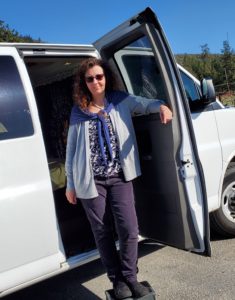 Living in a minivan camper for a period of time can be one way to save money to improve your financial situation, whether than means paying off debts or saving for retirement.
Living in a minivan camper for a period of time can be one way to save money to improve your financial situation, whether than means paying off debts or saving for retirement.
Shonda Sinclair and her husband are still a decade or more away from normal retirement age, but they are hoping that living in their van and working remotely will help them better prepare for the future. They are making plans to sell their home in Oregon, downsize their belongings, and travel (and work) in their van. Like a lot of Americans, Shonda says they lack retirement savings, so finding creative lifestyle solutions is important for them.
“I expect to travel and live in the van at least half the year, every year, for an indefinite number of years” Shonda said. “At least the next 10 years. Maybe more. I don’t look at it as being forced into the lifestyle. I look at it as getting to join the lifestyle and live the way I want while enjoying the benefits of a much-reduced monthly debt burden. I don’t expect to stay at paid sites daily.”
My First-Time Minivan Camping Experience
My first camping trip in my minivan was for two nights to a Florida state park. It was a solo adventure, since my wife is spending time this spring out-of-state near one of our daughters and our only grandchild. Besides, she’s not convinced yet to join me in this new adventure.
This was not only my first time sleeping in a minivan but my first night ever to spend in a campground. I know that will sound bizarre to many of you who are life-long campers. Our parents weren’t campers and we never embraced the habit either. We have never slept in a tent as adults or owned an RV, so this lifestyle is new to us. We have discussed buying an RV many times over the years and are fascinated by them, but we have never been smitten enough with the RV bug to shell out the big bucks to buy one. Maybe someday …
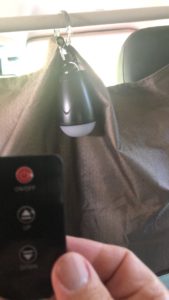
This usb-rechargeable light with a remote control proved valuable inside my minivan.
Like most new campers, it’s going to take awhile to figure out what to buy or bring along to make the experience better. The research I did on the Facebook group MinivanRV Camping and on Pinterest and YouTube paid off. Thanks to that research, I bought a few inexpensive items that proved to be invaluable, such as a USB rechargeable electric fan, a USB rechargeable hanging light with a remote control (very useful in bed at night), and one of my favorite finds, a mesh shower caddy to take toiletries to the campground’s bathhouse. It’s important to get fresh air in the car in the evenings, but Florida campgrounds are buggy, so I bought some magnetic window screens from Skeeter Beater. They worked great. I had no problems with bugs inside the van, not even those tiny “no-see-ums” pests that swarmed every evening around dusk.
I was also glad I opted to stay in a campground with electric and water at each campsite and a nearby bathhouse. Yes, it’s cheaper to boondock and stay in the wilderness, but I’m not ready yet for that level of roughing it. We own an electric cooler, so I was able to keep it plugged in the entire time and keep my food and drinks chilled. I even brought my travel-size Keurig coffee machine. After all, who wants to face the morning without coffee? I felt safer with other campers around me in a secured state park; only those who pay admission can enter the park and the gates close at sunset.
Compared with hotels or commercial RV parks, staying at state parks is a great bargain, especially for seniors. Here in Florida, senior citizens who are residents get a significant discount. My total cost for two nights at the campground, including tax, was $35. That’s a great deal!
Those who prefer to boondock come up with creative ways to deal with the lack of bathroom facilities. There are a variety of portable camping toilets on the market, the most popular being the Luggable Loo. For showers, you can purchase portable tent showers. A good number of minivan campers belong to a gym like Planet Fitness that has hundreds of locations where they can shower at any time. Van Dorn, who talks about his minivan conversion on his YouTube channel, SeniorTravel.TV, belongs to the Silver Sneakers program, one of the larger networks of fitness clubs available to seniors on Medicare. He showers at gyms that belong to the Silver Sneakers program. Truck stop showers are yet another option.
Wish List for Future Minivan Camping Trips
For future minivan camping trips, I have a growing wish list of things I’d like to buy or do differently. Some are more urgent than others. For instance, I realized how fortunate I was to have good weather. It never rained during my trip. What if it had? I had nowhere to go but to retreat to inside my van. That wouldn’t be much fun. So before I camp again, I want an additional shelter. I’m looking at both screen room tents (with rain flaps) and retractable awnings that fit onto the side roof of the minivan, similar to an RV awning. Eventually, I may want both, but for rain protection and to have a place to sit outside the van, I think some sort of tent or awning is important. Hashback tents, as shown in a photo earlier in this story, are another popular solution to this problem. Ease of setup will be a key consideration in my choice, since I will likely be traveling solo.
Some other items that would prove useful on future trips are:
1. An outdoor mat to place outside the door where you enter and exit the van. Not surprisingly, campgrounds are dirty, so without a mat you run the risk of trashing your van.
2. A better system for organizing and storing the stuff you carry. I slept on a cot with a thick pad, so there was a good deal of storage space under it. I will likely pick up some plastic bins with tops or drawers to better organize, unless I choose to build (or have built) a more permanent wood-frame bed with built-in storage.
3. Since I was only camping two nights and it was just me, I decided to bring only my breakfast foods, coffee, and drinks and go out for lunch and dinner each day. Most campers seem to enjoy cooking at their campsite, so next time I will plan to bring along a camp stove, a few basic cooking utensils, and some pre-planned camp meals. Since I will likely have electric power, I just might get brave and pack my small Instapot. We’ll see.
4. No matter how well you organize the space, it is limited and tight. For this reason, I plan to use a rooftop cargo bag, which we already own, on future trips. I can store larger items like camping chairs, tents, and beach gear up there. Hard-shell plastic storage boxes that mount to the roof or that sit behind the minivan using a trailer hitch are other popular choices for storage.
Benefits of Minivan Camping
I’m pleased to say I enjoyed my initial minivan camping experience and definitely plan to do it again. As expected, I learned a lot from this initial trip and have plenty of ideas for improving the experience next time. I’m still very much a newbie at this, but hopefully my observations will prove beneficial, especially to those of you who may be considering becoming minivan campers.
Here are some of the benefits that swayed me to try minivan camping:
It’s inexpensive: A major plus for us was that we already owned the minivan and didn’t have to invest in an RV. If you own a minivan or mid-to-large SUV, you may have all you need in terms of a vehicle for occasional camping excursions. We could buy a used travel trailer relatively cheap, but then we would also have to buy a pickup truck to pull it. Anyway you go with an RV, it’s expensive, especially compared with the minivan or SUV sitting in your driveway.
Storage and upkeep: We split our time between a 55+ community in Florida and a condo in Texas. We’re fortunate that our 55+ community offers free storage for RVs and boats, but if we had an RV, we would have nowhere to keep it at our Texas home. We would have to pay for storage. Plus, RVs require more maintenance and repairs can be expensive.
Your minivan can serve multiple purposes: Whereas most RVs sit idle most of the year, a minivan camper can still be your primary source of transportation when not camping. You can use it to haul the kids or grandkids, make runs to the hardware store, or drive it to the store. Minivans are amazingly versatile vehicles.
Camping in a minivan is a fun adventure: Figuring out how to make minivan camping work for you is part of the fun. If you are creative and adventuresome, you will enjoy the challenge of figuring out minivan camping.
Drawbacks of Minivan Camping
While some people live for long stretches at a time or even full time in their minivan campers, for most people, the minivan is best suited for relatively short trips. It lacks the headroom, space, and amenities needed for longer-term living. That is one drawback to using a minivan for camping.
Here are some other concerns regarding minivan camping:
Limits on where you can camp: RVs are welcome in nearly all campgrounds, at least if they are not too old and look OK. Minivans and SUVs, however, are not allowed for overnight sleeping at many commercial RV parks, especially the nicer ones. Some do and some do not, so you will need to check the website or call ahead. These parks consider it “sleeping in your car” which is frowned upon. On the other hand, minivans are generally accepted in state and national parks, BLM wilderness lands, and in some commercial RV parks. Even in parks that turn you away during their peak season, they may let you stay during the off season. It’s a good idea to always travel with a tent that can serve as your backup plan if the campground hassles you about sleeping in your van.
You can’t bring family or friends: RV’s often sleep four, six or even more people, but as discussed above, minivans are best for one or two campers only. You might be able to make space for a smaller grandchild, but otherwise making your camping trip into a family vacation is out of the question with a minivan. If your adult child owns an RV, however, equipping your minivan for camping may allow you to join your child and his or her family on a camping adventure, while having your own private sleeping quarters.
Minivan camping is for fair weather only: Minivans lack the heating and air conditioning systems found in RVs. It’s not too hard to use portable heaters or bed warmers to chase the chill away, provided you have a source of electric power, but if the weather is either too hot or too cold, sleeping in your minivan is not practical. A fan will help on warm nights, but beyond that, rigging up an A/C unit inside a minivan is not easy.
Will There Be a Sequel?
This is only the beginning of a new adventure for us. So stay tuned for updates in the months ahead. Here in the South, we’re moving into the warmer months soon, so I may not get to do much more van camping until fall. We will keep you posted on how it’s going.
In the meanwhile, if you have experience as a minivan camper, we’d love to hear from you. Share your stories and advice with us in the comments sections below.
Happy camping!
* * * * *
Note: This story does not contain any affiliate links. The author does not benefit from any products mentioned. This story is provided for informational purposes only.
Want to read more? See this related story: RV travel Booms for Seniors During COVID Pandemic
Love this story? Sign up below to receive future blog post from This Retirement Life, sent to your email box, free of charge, AND receive a copy of our NEW chart comparing the Top 20 Retirement States. This chart is only available to subscribers.

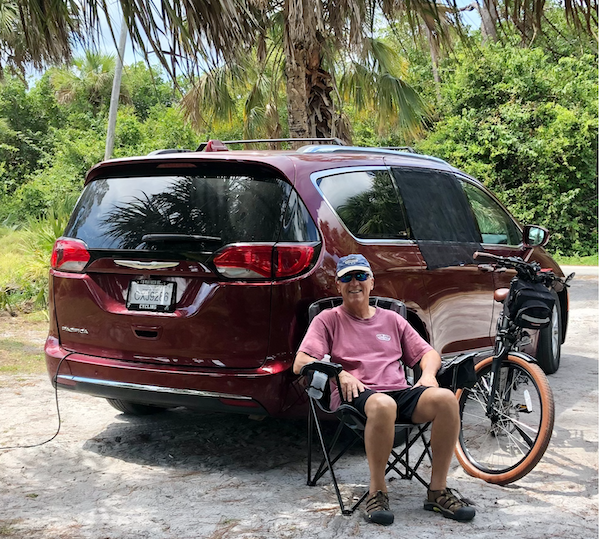







I’m technically no-build, but having been minivan camping since college have slide ins that equip my Honda Odyssey with a heated double sofa bed, full van-powered kitchen, portable toilet, and plenty of storage and can still seat four in stock seats. I’ve owned motorhomes, buses, a truck camper, and towables, but like the freedom of being able to camp unnoticed whether visiting the Statue of Liberty or The Great Smoky Mountains and still cook a full meal.
Thanks, Van. I enjoyed viewing your YouTube videos on seniortravel.tv.
Dave, what a great post about minivan camping for baby boomers and seniors! I have shared it on our social media in several places. We live in a Del Webb community and think this may be a great idea for us to try as well. My wife still has concerns about staying in a hotel so this may another benefit of this type of thing. Regards, Robert
Not quite retired yet but I have adopted the minivan approach to travel. I do a lot of backpacking, bicycling, and kayaking so having a bit more space for all the gear is nice. The only thing I wish I had more of is headroom but the logistics of owning a class B just doesn’t quite work out for me,
This was such an excellent overview! I’m a female solo minivan camper in my sixties, and I would love to see a follow-up article on campgrounds that allow minivan campers. So many are limited to RVs and tents, maybe with cabin and glamping options, but as you note, it can be difficult to find campgrounds that welcome minivan campers. I’m on the East Coast, where we have so many fewer free-camping options (like BLM land), so if you decide to take me up on this suggestion, please start with the East Coast!
Thank you, Andrea. That’s a great idea for a future blog story. At least in the South, most state and county parks with campgrounds allow minivan campers, but the problem is trying to find sites. The better ones book up a year in advance.